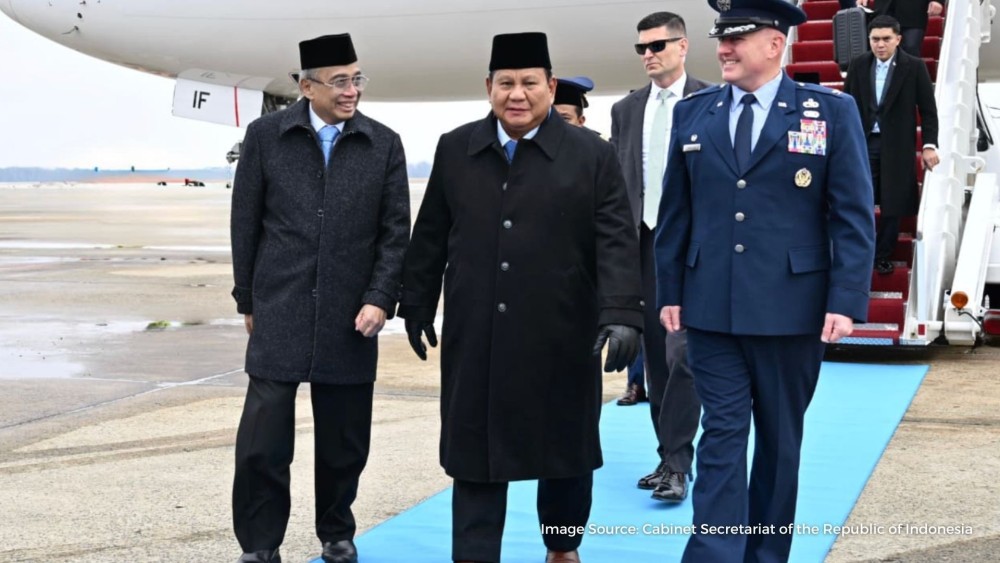Prabowo soars above others in electoral quick count, likely to be Indonesia’s 8th President
20 Feb 2024

Image Source: AFP
Mr. Prabowo Subianto was tracked to have obtained a significant lead over his competitors, Mr. Anies Baswedan, former Governor of Jakarta and former Minister of Education and Culture, and Mr. Ganjar Pranowo, former lawmaker and the current Governor of Central Java, with nearly 60% of the vote, according to numerous credible pollsters.
The decisive result came as a slight surprise as most polls had predicted the results for Mr. Subianto to be closer to the 50% percent threshold needed to secure a one-round victory. Mr. Baswedan came second with around 25% of the vote, followed by Mr. Pranowo with 16%.
The final result from the Indonesian General Election Commission (KPU) will not arrive until at least March 20, from which the President-elect will have until October 20 before he is sworn to office – a period when he, and the opposing camp, can be expected to start forming alliances that will form the new government.
Real Count Results as of February 19, 2024, 12:00:15
|
Candidates (President – VP) |
Votes |
Share (%) |
|
Prabowo Subianto – |
55,130,735 |
58.37 |
|
Anies Baswedan – |
22,978,054 |
24.33 |
|
Ganjar Pranowo – |
16,333,779 |
17.29 |
Source: General Election Commission (KPU), with up to 70.84% of the votes tallied
Mr. Subianto and his running mate, Mr. Gibran Rakabuming Raka, Mayor of the city of Surakarta and the son of President Jokowi, have declared victory based on the quick count results. Mr. Baswedan and Mr. Pranowo have yet to concede the election, though several foreign leaders, such as Singapore Prime Minister Lee Hsien Loong, Australian Prime Minister Anthony Albanese, and Indian Prime Minister Narendra Modi, have expressed their congratulations to Mr. Subianto.
Markets rallied following the announcement of the quick count results, with the Jakarta Composite Index gaining nearly 2%. Indonesia is expected to see a surge of capital inflow as investors expect the new government to continue President Jokowi’s successful economic policies.
Despite being unable to meet his goal of achieving 7% economic growth, Jokowi, who is no longer eligible to run as Indonesia has a two-term limit for presidencies, did preside over a surge of investments in the mining and processing sectors thanks to his policy of banning the export of raw minerals. Indonesia is one the world’s largest producers of coal, as well as the world’s largest producer of nickel. Jokowi also pushed for rapid infrastructure development, building more roads, railways, and airports than any of the previous administrations combined.
Main Output Target Ministry of Public Works and Public Housing 2022
|
Output |
Unit |
Target 2020-2024 |
Completed as of 2022 |
|
Dams |
Units |
61 |
34 (24 in process, 1 new, 9 completed) |
|
Toll Roads |
Km |
2513.45 |
183 |
|
Roads |
Km |
3000.1 |
846 |
|
Bridges |
Meters |
38,328.6 |
22,410 |
|
Public Apartments |
Units |
51,340 |
3,872 |
|
Public Housing |
Units |
262,345 |
20,757 |
Source: Ministry of Public Works and Public Housing
The question now is how Mr. Subianto and his running mate would carry his predecessor’s policies and turn Indonesia into an industrial nation while weathering the complex path of fluctuating commodity prices, as well as other domestic and global challenges.
In terms of campaign promises, Mr. Subianto has pledged to provide free school meals and milk to children, at an estimated cost of Rp 450 trillion (roughly US$28.81 billion) a year. He has also been advised to review the country’s massive fuel subsidies, which reached $32 billion last year. And though he has not provided further details as to if, when, or even how these plans would be done, he has been quoted as to be willing to review the country’s debt-to-GDP ratio, which has historically been kept between 30 and 40%, to fund them.
Additionally, Mr. Subianto will also inherit a number Jokowi’s landmark policies, specifically the establishment of a food estate and the development of Indonesia’s new capital city in the island of Kalimantan in Borneo. In this regard, investors seem to regard his victory positively as it gives some measure of assurance on their existing investment plans.
















